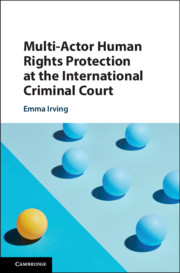Book contents
- Multi-Actor Human Rights Protection at the International Criminal Court
- Multi-Actor Human Rights Protection at the International Criminal Court
- Copyright page
- Dedication
- Contents
- Introduction
- 1 The Human Rights Obligations of the ICC
- Part I Multi-Actor Human Rights Protection
- 2 The Human Rights Obligations of States Parties to the Rome Statute
- 3 Suspects, Accused, Convicted, and Acquitted
- 4 Witnesses
- Part II Multi-Actor Human Rights Protection
- Part III Evaluation and Proposals
- Bibliography
- Index
4 - Witnesses
from Part I - Multi-Actor Human Rights Protection
Published online by Cambridge University Press: 28 February 2020
- Multi-Actor Human Rights Protection at the International Criminal Court
- Multi-Actor Human Rights Protection at the International Criminal Court
- Copyright page
- Dedication
- Contents
- Introduction
- 1 The Human Rights Obligations of the ICC
- Part I Multi-Actor Human Rights Protection
- 2 The Human Rights Obligations of States Parties to the Rome Statute
- 3 Suspects, Accused, Convicted, and Acquitted
- 4 Witnesses
- Part II Multi-Actor Human Rights Protection
- Part III Evaluation and Proposals
- Bibliography
- Index
Summary
The success of the ICC will rise or fall on its ability to secure testimony from witnesses. Eye witness accounts of what happened are crucial to all criminal trials. However, in order to get witnesses before the ICC, it is important that they be kept safe from any threats to their safety. If the threat is not too severe, the witness can remain in their home State, and the ICC will need to work with that State to ensure their protection. If the threat is very severe, the witness will need to be relocated abroad, in which case the ICC must find a State that is willing to host the witness and provide the necessary protection. In both situations, challenges can arise as a result of the multi-actor nature of the protection. While the ICC has worked on creative solutions to these challenges, the possibility remains that witness protection may be detrimentally affected.
- Type
- Chapter
- Information
- Publisher: Cambridge University PressPrint publication year: 2020

